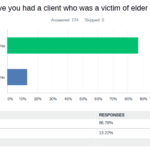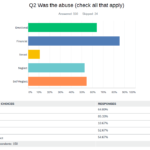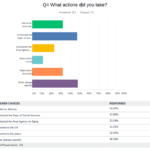Nearly 1 in 10 American senior citizens are abused or neglected each year, yet only 1 in 14 cases of elder abuse is brought to the attention of authorities, according to the U.S. Department of Health & Human Services. Elder abuse can mean physical and psychological harm, but it also may manifest through financial exploitation and theft. The United Nations has designated June as World Elder Abuse Awareness Month.
 To take action and be part of the solution, the Aging Life Care Association sent an InstaPOLL to members to see how prevalent elder abuse may be with their clients. Of the 171 members who responded to the poll, a whopping 151 or 87% indicated they had had a client who was a victim of elder abuse! The top three areas Aging Life Care managers saw abuse were:
To take action and be part of the solution, the Aging Life Care Association sent an InstaPOLL to members to see how prevalent elder abuse may be with their clients. Of the 171 members who responded to the poll, a whopping 151 or 87% indicated they had had a client who was a victim of elder abuse! The top three areas Aging Life Care managers saw abuse were:
- Financial exploitation– The unauthorized use of an elderly person’s funds or property, either by a caregiver or an outside scam artist. An unscrupulous caregiver might:
- Misuse an elder’s personal checks, credit cards, or accounts
- Steal cash, income checks, or household goods
- Forge the elder’s signature
- Engage in identity theft
Financial Abuse topped the chart with 128 responders or 86% of members indicating they had experienced this with their clients.
- Emotional elder abuse– The treatment of an older adult in ways that cause emotional or psychological pain or distress.
Emotional Abuse came in second with 96 responders or 64% indicating their clients had experienced this type of abuse
Elder neglect– Failure to fulfill a caretaking obligation. It can be intentional or unintentional, based on factors such as ignorance or denial that an elderly charge needs as much care as they do.
Self Neglect and Neglect– in general, were statistically close with 53% of responders indicating this type of experience with a client.
Elder abuse is a serious crime against some of our nation’s most vulnerable citizens. Aging Life Care Managers have focused on caring for these defenselessness, older adult members of society since its founding in 1985. The seasoned professional members of the Aging Life Care Association can identify what type of person is susceptible to abuse and the elusive signs a family may miss. They are also aware of the resources to refer to when abuse of any nature is suspected.
In interpreting the comments of those taking the survey, the Aging Life Care Managers felt that cognitive impairment due to Alzheimer’s disease and related dementia placed their elders at a high risk for abuse and neglect.
Members also indicated that the person most likely to be the abuser were often adult children, other family members such as grandchildren, or a spouse or partner. Perpetrators also frequently mentioned were those in a caregiving capacity.
An Aging Life Care Professional can help families prevent abuse by being their eyes and ears on the scene, monitoring and overseeing all interactions with the older adult. According to the poll, their primary source of referrals when abuse was identified were the Department of Aging, Attorneys and the police. Polled members indicated they were unfortunately frequently called in to assist families after the abuse occurred.
Elder abuse is a serious crime against some of our nation’s most vulnerable citizens,
And a matter of worldwide concern that demands a global multifaceted response.
For more information on World Elder Abuse Awareness Day, visit the National Center for Elder Abuse (https://ncea.acl.gov/) website. Additionally, the Department of Justice offers an abundance of information and resources online through its Elder Justice Initiative. (https://www.justice.gov/elderjustice)
If you suspect elder abuse, call 911 for an emergency. In a non-emergency situation, use the online Elder Care Locator, (https://eldercare.acl.gov/Public/Index.aspx)
or you may call 1-800-677-1116 to find your local elder care agency.
About the Author: Barbara (Bobbi) Kolonay RN MS CCM. Owner of Holistic Aging (www.holisticaging.com) An Aging Life Care Management practice in Pittsburgh PA. Fellow of the Leadership Academy of ALCA

